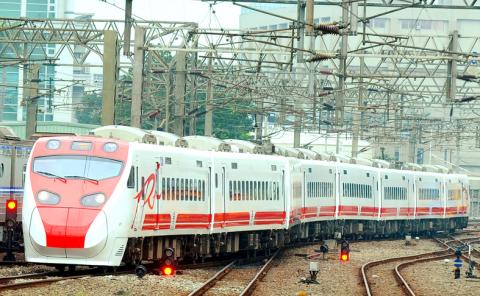The Puyuma Express tilting train will begin its pilot service today after passing an independent verification and validation (IV&V) process by the UK-based Lloyd’s Register Group, the Taiwan Railways Administration (TRA) said yesterday.
“To ensure that the train fulfills safety regulations in its design and test runs, we asked an independent third party to execute the IV&V procedure,” the agency said.
The TRA expected to receive confirmation of the safety certification on Monday, but it did not arrive until 10am yesterday.

Photo: Wang yi-sung, Taipei Times
It said the delay was caused by the time difference between Taiwan and the UK, adding that its officials had stayed up late on Monday night to provide the supplementary documents requested by Lloyd’s.
The TRA has scheduled the pilot service to depart Shulin (樹林), New Taipei City (新北市), at 9:20am and arrive at Taipei Main Station at 9:40am, Songshan Station at 9:48am, Yilan station at 10:52am, Luodong (羅東) station in Yilan County at 11am and Hualien station at 11:50am.
The TRA ordered 136 tilting carriages from Nippon Sharyo, 16 of which were delivered at the end of last year.
To handle the expected crowds during the Lunar New Year holiday, the agency said eight trains would pass the IV&V procedure and start operating before the holiday begins on Saturday.
To reassure the public about the safety of the Puyuma Express, the TRA has made public the IV&V certification documents from Nippon Sharyo and Lloyd’s Register Group.
The TRA said the Puyuma Express allows for 56 runs to be added to the schedule between today and Feb. 18, providing an additional 2,000 seats per day.
However, tickets for the Puyuma Express during the nine-day-long Lunar New Year holiday have already sold out, the TRA said.

DAREDEVIL: Honnold said it had always been a dream of his to climb Taipei 101, while a Netflix producer said the skyscraper was ‘a real icon of this country’ US climber Alex Honnold yesterday took on Taiwan’s tallest building, becoming the first person to scale Taipei 101 without a rope, harness or safety net. Hundreds of spectators gathered at the base of the 101-story skyscraper to watch Honnold, 40, embark on his daredevil feat, which was also broadcast live on Netflix. Dressed in a red T-shirt and yellow custom-made climbing shoes, Honnold swiftly moved up the southeast face of the glass and steel building. At one point, he stepped onto a platform midway up to wave down at fans and onlookers who were taking photos. People watching from inside

A Vietnamese migrant worker yesterday won NT$12 million (US$379,627) on a Lunar New Year scratch card in Kaohsiung as part of Taiwan Lottery Co’s (台灣彩券) “NT$12 Million Grand Fortune” (1200萬大吉利) game. The man was the first top-prize winner of the new game launched on Jan. 6 to mark the Lunar New Year. Three Vietnamese migrant workers visited a Taiwan Lottery shop on Xinyue Street in Kaohsiung’s Gangshan District (崗山), a store representative said. The player bought multiple tickets and, after winning nothing, held the final lottery ticket in one hand and rubbed the store’s statue of the Maitreya Buddha’s belly with the other,

‘NATO-PLUS’: ‘Our strategic partners in the Indo-Pacific are facing increasing aggression by the Chinese Communist Party,’ US Representative Rob Wittman said The US House of Representatives on Monday released its version of the Consolidated Appropriations Act, which includes US$1.15 billion to support security cooperation with Taiwan. The omnibus act, covering US$1.2 trillion of spending, allocates US$1 billion for the Taiwan Security Cooperation Initiative, as well as US$150 million for the replacement of defense articles and reimbursement of defense services provided to Taiwan. The fund allocations were based on the US National Defense Authorization Act for fiscal 2026 that was passed by the US Congress last month and authorized up to US$1 billion to the US Defense Security Cooperation Agency in support of the

HIGH-TECH DEAL: Chipmakers that expand in the US would be able to import up to 2.5 times their new capacity with no extra tariffs during an approved construction period Taiwan aims to build a “democratic” high-tech supply chain with the US and form a strategic artificial intelligence (AI) partnership under the new tariffs deal it sealed with Washington last week, Taipei’s top negotiator in the talks said yesterday. US President Donald Trump has pushed Taiwan, a major producer of semiconductors which runs a large trade surplus with the US, to invest more in the US, specifically in chips that power AI. Under the terms of the long-negotiated deal, chipmakers such as Taiwan Semiconductor Manufacturing Co (TSMC, 台積電) that expand US production would incur a lower tariff on semiconductors or related manufacturing